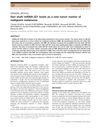 8 citations,
November 2020 in “Frontiers in Cell and Developmental Biology”
8 citations,
November 2020 in “Frontiers in Cell and Developmental Biology” Certain genes are more active in baby scalp cells and can help grow hair when added to adult mouse skin cells.
 8 citations,
September 2017 in “Journal of Natural Medicines”
8 citations,
September 2017 in “Journal of Natural Medicines” Applying an extract from Perilla frutescens helps hair grow and fights the effects of hair loss hormones.
 8 citations,
February 2014 in “Stem cells translational medicine”
8 citations,
February 2014 in “Stem cells translational medicine” Modified stem cells that overexpress a specific protein can improve hair growth and reduce hair abnormalities in mice.
 7 citations,
January 2015 in “Genetics and molecular research”
7 citations,
January 2015 in “Genetics and molecular research” The RORα gene is active in different parts of cashmere goat hair follicles and may be influenced by melatonin, especially in December when hair growth changes.
 7 citations,
January 2015 in “Hair therapy & transplantation”
7 citations,
January 2015 in “Hair therapy & transplantation” Air pollution can cause hair loss, and using antioxidants, special shampoos, and coconut oil can improve scalp health and hair density.
 7 citations,
December 2014 in “Journal of dermatology”
7 citations,
December 2014 in “Journal of dermatology” Hair shaft miR-221 levels can help detect malignant melanoma.
 7 citations,
November 2014 in “Histochemistry and Cell Biology”
7 citations,
November 2014 in “Histochemistry and Cell Biology” The we/we wal/wal mice have defects in hair growth and skin layer formation, causing hair loss, useful for understanding alopecia.
 7 citations,
January 2013 in “The journal of investigative dermatology/Journal of investigative dermatology”
7 citations,
January 2013 in “The journal of investigative dermatology/Journal of investigative dermatology” T-cell reconstitution after thymus transplantation can cause hair whitening and loss.
 5 citations,
January 2016 in “Dermatology”
5 citations,
January 2016 in “Dermatology” No significant link between CAG repeat numbers and female pattern hair loss in Han Chinese population.
 5 citations,
October 2014 in “Methods”
5 citations,
October 2014 in “Methods” The document explains how to create detailed biological pathways using genomic data and tools, with examples of hair and breast development.
 4 citations,
March 2014 in “The FASEB Journal”
4 citations,
March 2014 in “The FASEB Journal” The HIF-2α/ARNT complex is important for hair follicle development by controlling cell growth.
 3 citations,
January 2021 in “Applied sciences”
3 citations,
January 2021 in “Applied sciences” Fermented red ginseng and a traditional herb mix improved hair growth in mice.
 3 citations,
September 2019 in “Clinical and experimental dermatology”
3 citations,
September 2019 in “Clinical and experimental dermatology” Basal cell carcinomas may differentiate similarly to hair follicles and could be influenced by hair cycle-related treatments.
 2 citations,
October 1999 in “Annals of the New York Academy of Sciences”
2 citations,
October 1999 in “Annals of the New York Academy of Sciences” Melatonin and cortisol affect mink winter hair growth, but β-endorphin levels do not.
 1 citations,
October 2023 in “bioRxiv (Cold Spring Harbor Laboratory)”
1 citations,
October 2023 in “bioRxiv (Cold Spring Harbor Laboratory)” Printing human stem cells and a special matrix during surgery can help grow new skin and hair-like structures in rats.
 1 citations,
August 2023 in “Biomolecules & therapeutics”
1 citations,
August 2023 in “Biomolecules & therapeutics” HAPLN1 can promote hair growth and may help treat hair loss.
 1 citations,
January 2023 in “International journal of all research education and scientific methods”
1 citations,
January 2023 in “International journal of all research education and scientific methods” Hair analysis is better than urine and blood for detecting past drug use.
 1 citations,
March 2018 in “bioRxiv (Cold Spring Harbor Laboratory)”
1 citations,
March 2018 in “bioRxiv (Cold Spring Harbor Laboratory)” The hair treatment made hair grow faster and thicker and strengthened the hair roots.
 1 citations,
January 2015 in “Genetics and Molecular Research”
1 citations,
January 2015 in “Genetics and Molecular Research” Stopping S100A3 activity slows down hair growth in mice.
 August 2024 in “International Journal of Basic & Clinical Pharmacology”
August 2024 in “International Journal of Basic & Clinical Pharmacology” Secretome-based therapies could improve hair growth better than current treatments.
 December 2023 in “Journal of materials chemistry. B”
December 2023 in “Journal of materials chemistry. B” A new nanoemulsion increases oxygen for hair cells, leading to better hair growth.
 January 2021 in “Journal of cosmetology & trichology”
January 2021 in “Journal of cosmetology & trichology” L-(+)-Tartaric Acid may help increase certain hair growth genes without harming cells.
 January 2021 in “Journal of cosmetology & trichology”
January 2021 in “Journal of cosmetology & trichology” Ageratum conyzoides L. extract may effectively and safely treat hair loss.
 April 2018 in “The journal of investigative dermatology/Journal of investigative dermatology”
April 2018 in “The journal of investigative dermatology/Journal of investigative dermatology” Blue light can help hair grow by affecting certain receptors in hair follicles.
 April 2018 in “The journal of investigative dermatology/Journal of investigative dermatology”
April 2018 in “The journal of investigative dermatology/Journal of investigative dermatology” Ginseng and Albizia extracts may help prevent age-related hair thinning.
 January 2018 in “Springer eBooks”
January 2018 in “Springer eBooks” Lasers are FDA-approved for permanent hair reduction, not removal, and more research is needed to improve treatments.

Forensic hair analysis for drugs is now more reliable and accurate.

Modern hair restoration techniques can effectively treat hair loss and provide natural-looking results.
 January 2012 in “Elsevier eBooks”
January 2012 in “Elsevier eBooks” Hair loss can cause emotional and social issues, and various treatments, including medication, surgery, and psychological support, are needed.
 January 2011 in “Springer eBooks”
January 2011 in “Springer eBooks” Eating a balanced diet with the right vitamins and minerals is important for healthy hair, but too many supplements can be harmful.





























